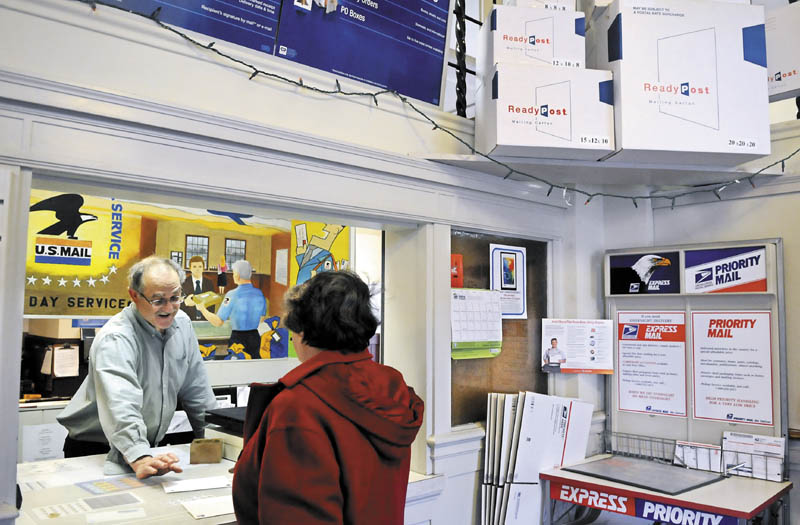John Hills, who owns a small business in Portland, said it’s not uncommon for him to get customers’ checks in the mail on Saturdays.
Even if the U.S. Postal Service ends Saturday delivery of first-class mail, however, he’ll be OK. “It might just be a relief,” Hills said. “It’s one less day I’ll get junk mail.”
Dega Dhalac, of South Portland, said she doesn’t get much mail that can’t wait two days, but she’s a little worried about her Netflix.
She tries to time her orders so that her DVDs come in the mail on Saturday and she can watch them over the weekend. If Saturday delivery ends, she’ll just have to make sure her movies and TV shows arrive by Friday, she said.
Curtis Chapin, of South Portland, said he doesn’t even check his mail every day because, most of the time, there’s nothing important.
He still gets bills in the mail but he pays them online. He gets Netflix, too, but the company always sends an email to let him know when to expect the next disc.
The U.S. Postal Service announced Wednesday that it plans to end Saturday delivery in August to save an estimated $2 billion a year. It would continue to deliver packages six days a week, mostly because that service generates revenue and dropping it would boost competitors like UPS.
Mail would still be delivered to post office boxes on Saturdays, and post offices that now are open on Saturdays would remain open.
Many Mainers said Wednesday that they aren’t worried about the possible end of Saturday delivery, but the state’s congressional delegation voiced strong concerns.
“We are writing to urge you to take immediate legislative action to set the U.S. Postal Service on a long-term, sustainable path,” U.S. Reps. Mike Michaud and Chellie Pingree wrote in a letter Wednesday to House leadership. “This unnecessary action could disproportionately affect rural communities that depend on reliable and timely mail delivery.”
U.S. Sens. Angus King and Susan Collins also expressed disappointment.
“In effect, the plan to end selected service, while generating cost savings, could have a significant detrimental impact on the regular delivery of items that are vital to Mainers and small businesses throughout the state,” King said.
Collins said, “The service upon which so many American families and businesses rely will only deteriorate with the end of six-day, first-class mail delivery. This may pose problems for newspapers that are mailed to customers, for seniors who rely on prescription drug deliveries, and for small businesses who send advertising flyers, among others.”
The proposal to end Saturday service is based on what appears to be a legal loophole, The Associated Press reported. Congress has long banned five-day-only mail delivery in its spending bills, but because the government is now operating under a temporary spending measure rather than an appropriations bill, Postmaster General Patrick Donahoe says the Postal Service can make the change itself.
The agency essentially wants Congress to keep the ban out of any new spending bill after the temporary measure expires March 27.
The Postal Service has been hemorrhaging money for years, including $16 billion in losses last year. It has taken cost-cutting steps over the last several years, including reducing hours at some post offices and closing others. It has advocated for eliminating Saturday delivery, but has never gotten approval from Congress, which oversees the Postal Service but does not fund it with tax dollars.
Tom Rizzo, the Postal Service’s spokesman for northern New England, said the agency is working with major mailers such as weekly magazines to make sure they are well versed on deadlines.
He said the announcement was made Wednesday to give people the time between now and August to adjust.
The union that represents Maine’s letter carriers decried the announcement.
“We believe this would be a death spiral for the Postal Service,” said Mitch Bowman, president of the Maine State Association of Letter Carriers. “Taking away a day of delivery would mean taking away a day of business for Maine businesses. It is our opinion this proposed lower standard of services does not meet needs of Maine people.”
Some Mainers who spoke Wednesday said the change simply reflects a shift in the way people use mail. In the last decade, the amount of first-class mail dropped by 50 percent. Letters have been replaced by emails and text messages. Bills have been replaced by online statements.
Moya Easterling, of Limington, has a post office box in Portland, so she will continue to get mail on Saturdays; but she said she checks her box only every month or so.
On Wednesday, she found a stack of mail stuffed inside it. She sifted through the mail, noting nothing in the stack that was particularly time-sensitive. One piece of mail was a wedding invitation, she said, but she had known about the wedding for months.
Elaine Gutgsell of Portland, who is 86, said she has watched life around her go digital. She still writes letters, pays bills by writing and mailing checks, and gets her payroll checks in the mail, usually on Saturday.
Even so, she’s not worried about the end of Saturday delivery. “One or two more days is not going to make much difference,” she said.
Mike Mulhall, of Standish, said he sometimes gets important mail on Saturdays, but he’ll just make adjustments if Saturday mail is discontinued.
“It’s a changing world,” he said. “What choice do I have?”
Send questions/comments to the editors.


